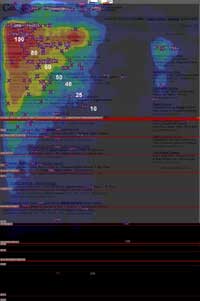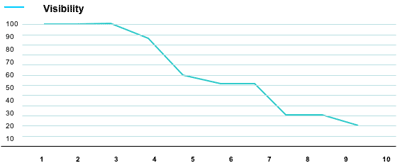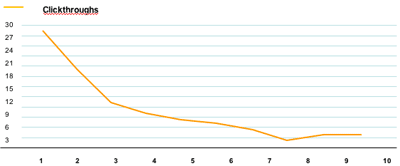New eyetracking study: where Google searchers look and click
 I found the eyetracking study from Enquiro and Did-It unveiled last week at Search Engine Strategies and covered in Search Day fascinating. The aggregate heat map shown on the right (larger version here) shows where participants focused their eyes (and their attention) the most. As you can see, the first listing not only drew the most attention; the full listing was read more fully from left to right, than other listings.
I found the eyetracking study from Enquiro and Did-It unveiled last week at Search Engine Strategies and covered in Search Day fascinating. The aggregate heat map shown on the right (larger version here) shows where participants focused their eyes (and their attention) the most. As you can see, the first listing not only drew the most attention; the full listing was read more fully from left to right, than other listings.
Visibility drops the further down the search results you go, and clickthroughs drop even more markedly (as you can see from the graphs below). This got me thinking about Zipf’s Law. Zipf’s Law is applicable to Top Ten Lists, as Seth Godin explains, perhaps Zipf’s Law might be applicable to the SERPs (search engine results pages) too? (In general terms, Zipf’s Law states that being #1 is much, much better than being #2 which is much, much better than being #3 and so on. So dominating a Top 10 list is critical.) Although these graphs don’t follow Zipf’s Law exactly, nonetheless given this data I’d consider it foolish to be complacent if your search listings are not at the very top of the SERPs.
What is it about searchers that makes them so blind to relevant results further down the page? Is this due to the “implied endorsement” effect, where searchers tend to simply trust Google to point them to the right thing? Or is it just the way humans are wired, to make snap decisions, as Malcolm Gladwell insightfully explains in his new book, Blink? According to the study, 72% of searchers click on the first link of interest, whereas 25.5% read all listings first, then decide. My guess is that both effects (“implied endorsement” and “rapid cognition”) play a role in searcher behavior.
A few other important take-aways from the study:
- 6/7 (85%) of searchers click on natural (“organic”) results (not 60/40 as the search engines and PPC (pay-per-click) vendors would have you believe).
- The top 4 sponsored slots are equivalent in views to being ranked at #7 – #10 natural.
- (corollary to #2): This means if you need to make a business case for natural search, then (assuming you can attain at least #3 rank in natural for the same keywords you bid on) natural search could be worth two to three times your PPC results.
In all, a superb research study. Great job Did-It, Enquiro, and EyeTools!







